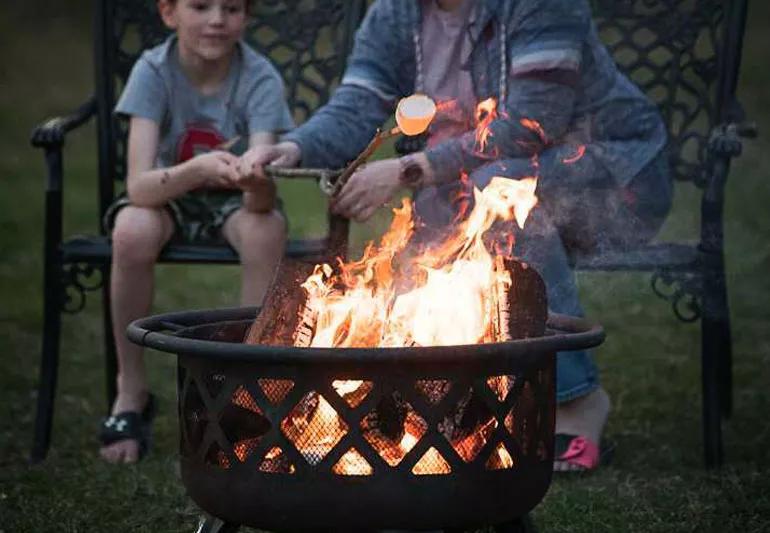Some tips to make your next fire safer

Image content: This image is available to view online.
View image online (https://assets.clevelandclinic.org/transform/780a2758-d732-4129-a663-689f06d06781/firepit-040721-MK-770x553-1_jpg)
family roasting marshmallows around firepit
Planning to gather friends or family around a crackling bonfire or cozy fire pit? Absorb the atmosphere — not the smoke.
Advertisement
Cleveland Clinic is a non-profit academic medical center. Advertising on our site helps support our mission. We do not endorse non-Cleveland Clinic products or services. Policy
Wood smoke contains millions of tiny particles. When you breathe in smoke, the particles can get deep into your respiratory system.
You’ve likely experienced the results before — stinging eyes, runny nose and coughing. These symptoms are short-lived for most people. But for those with underlying respiratory illnesses, inhaling smoke is dangerous.
Here’s how to protect your lungs and make your next fire safer, according to pulmonologist Bohdan Pichurko, MD.
Most people can enjoy an outdoor fire safely by not sitting too close and not breathing in the smoke. But it’s a different story for the nearly 40 million Americans with asthma or chronic obstructive pulmonary disease (COPD), including emphysema, says Dr. Pichurko.
“If you have an underlying respiratory disease, inhaling smoke from wood, even briefly, can cause a chain of airway tightening that can land you in the emergency room. If you have asthma or COPD, take extra precautions,” he advises. “Sit as far from the fire as possible, and pay attention to which way the wind is blowing at all times.”
Smoke isn’t the only health hazard you should avoid. The heat itself is harmful. “Inhaling air that is consistently at a higher temperature than the surrounding air can cause more damage to the lining of your lower respiratory tract than smoke inhalation,” says Dr. Pichurko.
Advertisement
If you feel intense heat on your hands or face, that’s a clear signal that the air you’re breathing is too hot and you should move back from the fire.
If you’re like most people, you may not give much thought to constructing your fires. But Dr. Pichurko says you should. Here are his seven best tips for building safer fires outdoors:
So don’t say goodbye to toasted marshmallows or cozy nights. Follow the tips outlined above, and you’re on your way to enjoying outdoor fires safely.
Advertisement

Sign up for our Health Essentials emails for expert guidance on nutrition, fitness, sleep, skin care and more.
Learn more about our editorial process.
Advertisement
The right treatment starts with the right diagnosis
OTC meds, rest, fluids and an anti-inflammatory diet can help you get through big and small weather changes
Allergies, postnasal drip, asthma or reflux could be to blame for a cough that won’t quit
‘Walking pneumonia’ is milder and doesn’t always require medication — but it’s also highly contagious
Wearing a scarf, adjusting your outdoor activities and following your asthma treatment plan can help limit breathing problems
Vaping exposes you to thousands of chemicals, including many that are known to cause cancer and lung disease
Several conditions, like vitiligo and fungal infection, can cause a loss of pigmentation, leading to white spots or patches on your skin
Diaphragmatic breathing, pursed lip breathing and huff coughing can help manage COPD symptoms, like chest congestion and shortness of breath
Although it could be used as a moisturizer, this new trend is not recommended
Communicating clear limits helps protect your time, energy and emotional well-being
High cholesterol can be genetic, but testing and treatment can lower your heart disease risk